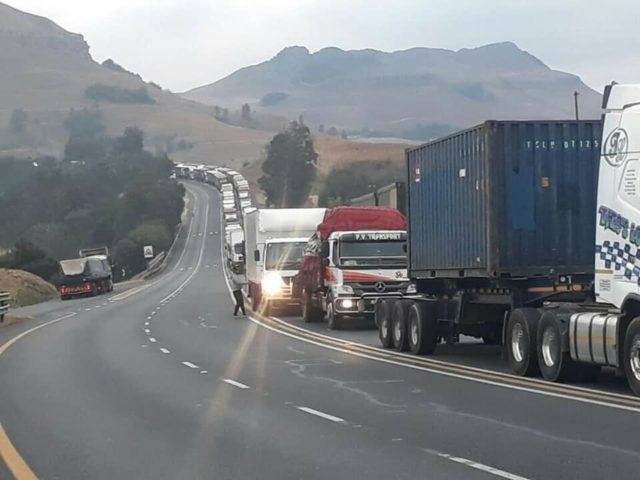Government has set up another task team to address issues relating to the trucking industry, after a recent blockade of arterial roads that threatens South Africa’s export and import markets.
NO GUARANTEES to truck drivers were on the table on Monday as the government set up another task team to address issues relating to the industry, after a recent blockade of arterial roads, which threatens South Africa’s export and import markets.
The team is to investigate the registration of operators in terms of Section 45 of the National Road Traffic Act; review the Traffic Register Number; review the Cross-Border Road Transport Legislation; amendment of the National Road Traffic Regulation; integrated joint multi-disciplinary law enforcement operations; implementation of the Driver Training Programme; as well as consider the introduction of operating licenses for the industry.
But time is not on government’s side.
Sifiso Nyathi, secretary of the All Truck Drivers Forum and Allied South Africa (ATDF ASA), said on Monday: “The transport industry is not like the water or electricity industry where people can be patient, if they face a problem. This business is about hunger of the people… If people are hungry and their jobs are taken by people from afar, they will get angry and they want to take action now.”
Nyathi said the marathon meetings which began on Sunday evening, culminating in Monday’s pronouncements by the government were a welcome development that had made some progress, but truck drivers were driven more by their livelihoods than politics.
The Road and Freight Inter-Ministerial Committee at the weekend met in Pretoria with industry players that included, among others, the SA Transport and Allied Workers Union (Satawu), the industry Bargaining Council, the ATDF and the Transport Association of South Africa.
All the parties signed an agreement committing to the plan. The IMC includes the ministers of employment and labour, transport, police, and Home Affairs.
“The government stays quite for too long and then expect things to just run smoothly. When we have grievances, there is nobody to listen to us, which is when we take to the roads. Then they feel like discussing matters when we have spent five years on the same issues with no resolution,“ Nyathi said.
Economist Chris Hattingh of the Free Market Foundation said the recent blockade of the N3 – one of the busiest and most crucial routes on the continent for economic activity – would be felt up and down all the supply chains countrywide.
“The longer the blockades persisted, such disruptions would eventually be felt by consumers in the form of higher food and goods prices,” he said.
Transnet reopened one of its rail lines on the container corridor between Durban Port in the city’s South Industrial Basin, and Cato Ridge. This follows repairs to infrastructure resulting from flood damage earlier in the year. However, just as operations in Durban may be returning to a better footing, these recent truck blockades will yet again disrupt economic activity and the movement of goods.
“Any disruption to trade and the free economic activity between people – no matter how big or small – has the potential to increase uncertainty. With increased uncertainty and heightened security risks, come higher costs in terms of business operations. Again, the ultimate victims are the consumers. And in South Africa, consumers are already under pressure from rising inflation, increased fuel prices, and food costs. It is likely that the Reserve Bank will once more raise interest rates later in the year, further dampening economic activity,” Hattingh said.
He said these blockades served as an unfortunate reminder that, had the country’s rail networks been maintained and upgraded, freight companies and businesses could have used them (at lower cost) to move materials, goods and products around the country.
But with the decline in the railways, more businesses had shifted to road freight. This damaged the roads, but also carried increased business risks, when events such as road blockades occur.
Hattingh said the country’s growth numbers for the first quarter of this year were better than expected. However, the KwaZulu-Natal floods, persistent load shedding, and now blockades on the N3, would all combine to depress economic activity and growth in the second quarter.
– BUSINESS REPORT








